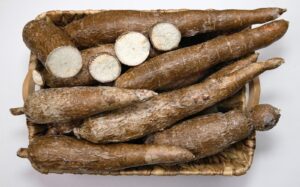Also called cassava or manioc, yuca is a nutritious tuber used in many cuisines globally. But those unfamiliar with yuca often wonder, what does yuca taste like? This article explores yuca’s flavor, texture, uses, and how to prepare it safely.
Table of Contents
An Introduction to Yuca
Yuca, pronounced YOO-ka, is a starchy root vegetable native to South America:
- The long, cylindrical tuber has brown fibrous skin and crisp white flesh.
- A major staple food in Latin America, Africa, Asia and the Caribbean.
- Contains toxins that must be removed by cooking or processing before eating.
- Sold fresh, frozen, dried into tapioca pearls or flour.
- Imparts a subtle sweet, nutty flavor along with carbohydrate energy.
Keep reading to learn more about enjoying yuca safely.
What Does Yuca Taste Like? Flavor and Texture
When properly prepared, yuca offers a resilient texture and mild flavor:
- Subtle earthy, nutty and sweet taste
- Slight vanilla undertones
- Neutral background flavor
- Crisp and creamy when raw, soft and fluffy when cooked
- Dense, fibrous flesh
- Drier than potatoes when cooked
- Very low in sugar compared to sweet potatoes
Yuca has a more neutral starchy taste than carrots or sweet potatoes. It takes on the flavors it is cooked with.
How to Cook With Yuca
Yuca must be thoroughly cooked before eating to remove toxins. Cooking options include:
- Boiling – The most common preparation. Cut in pieces and boil until tender.
- Frying – French fry or cube and fry in oil until crispy outside, creamy inside.
- Baking – Baked yuca wedges make great oven fries.
- Mashing – Boil and mash with butter, garlic and herbs.
- Soup thickener – Added to stews and soups, it helps thicken broth.
Always peel, cut out fibrous veins, and cook yuca first. Undercooked yuca can cause digestive upset.
Dishes That Showcase Yuca’s Taste and Texture
Yuca takes well to many global flavors and preparations:
- Yuca fries – The most popular appetizer; crisp exterior with creamy interior.
- Carimañola – Colombian yuca patties stuffed with meat, cheese or lentils.
- Tapioca pudding – Made from starchy yuca pearls, flavored with vanilla, fruit.
- Farofa – Toasted yuca flour in Brazilian cuisine.
- Tacacho – Roasted and mashed yuca formed into patties in the Amazon.
- Gari – Fermented yuca used in West African stews to add texture.
Yuca substitution works well in many gnocchi, bread, pastry, porridge or hash brown recipes.
What Does Yuca Taste Like Compared to Other Root Vegetables?
Contrasting yuca with other roots helps define its particular qualities:
Potatoes – Yuca has a more neutral flavor. Potatoes taste sweeter and starchier.
Sweet Potatoes – Much richer, sweeter taste and orange color than yuca’s mildness.
Cassava – Identical flavor since they are the same plant species. Regional names vary.
Plantains – Plantains possess a potent banana-like taste absent in yuca.
Jicama – Similar crisp, juicy crunch but jicama is sweeter while yuca is more starchy.
Yucca – Despite the similar name, yucca is an entirely different plant. Yuca is edible, yucca is not.
Nutrition Facts and Health Benefits of Yuca
Yuca contains beneficial nutrients:
- Very high in carbohydrates, especially starch, for energy.
- Low in sugar, fat, and protein compared to other root vegetables.
- Rich source of vitamin C, calcium, phosphorus and manganese.
- Provides substantial fiber when skins are consumed.
- Gluten-free and suited for restricted diets.
- Offers B vitamins, antioxidants, and minerals that support health.
Key Takeaways on Yuca’s Taste, Texture and Uses
To recap, key points about yuca flavor include:
- Yuca has a subtle earthy, nutty and sweet flavor. It’s more starchy versus sugary sweet.
- Always cook yuca thoroughly to remove potentially toxic compounds. Boiling, frying and baking are common preparations.
- Yuca works well in many Latin American recipes, from fried yuca to puddings and stews. It substitutes for potatoes in many dishes.
- Compared to other roots, yuca is not as sweet as sweet potato or starchy as regular potato. Its taste is relatively neutral.
- While low in fat and protein, yuca provides essential vitamins, minerals and digestion-friendly fiber.
With proper preparation to remove toxins, the resilient yuca root can offer health benefits along with its mild versatile flavor.


